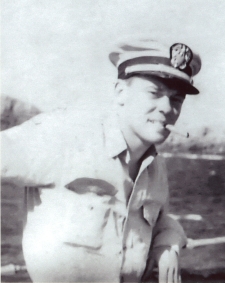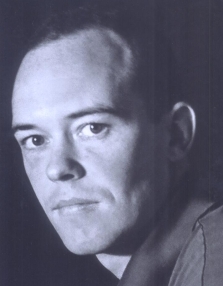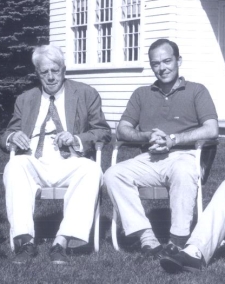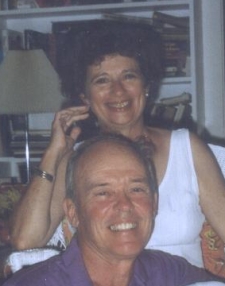Anthony Robinson
A Brief Biography
Anthony Robinson, the youngest of Gertrude and Henry Morton Robinson's three children, grew up on Maverick Road in Woodstock, New York. The Robinsons' neighbors were the painters, sculptors, and musicians who lived and worked in the Maverick Art Colony. Young Tony Robinson wandered freely in the Colony in the years prior to World War II, making many friends, among them the man who founded the Colony in 1905, Hervey White.
Tony caddied at the Woodstock Golf Course and fished in the nearby Ashokan Reservoir, hunted and trapped in the fall and winter. At twelve he had his own trapline, checking his sets each morning before school, dreaming that one of his muskrat pelts would take first prize in the annual Sears & Roebuck Best Pelt Competition. His career ambition, in that period of his life, was to be a forest ranger.
His father, in no way critical of his son's activities or dreams, nonetheless thought that Tony would benefit by going away to school. Henry Morton Robinson (who would gain fame with his 1950 best-selling novel The Cardinal and A Skeleton Key to Finnegan’s Wake with Joseph Campbell) enrolled his son at Phillips Academy, Andover, wanting him to have a top education and get to meet boys outside of rural Ulster County.
For the most part, Tony's four years at Andover weren't happy ones. The school was too big, too removed from the life he had known, and he felt lost from the start. He kept his unhappiness to himself and began to write. A story about his beagle killed by a car, "My Finnegan," appeared in Hounds and Hunting in 1949. It was his first published work.
His college years were more rewarding. Several of Tony's professors at Columbia, notably Mark Van Doren and George Nobbe, influenced him greatly, encouraging him to pursue a career in writing. Tony joined Alpha Delta Phi, founded as a literary society in 1832, and on
Military service was compulsory at the time, and after graduating from Columbia in 1953 Tony earned his commission at OCS in Newport, R.I., serving on the USS Owen, a WWII destroyer, in the final days of the Korean War. A story he wrote aboard ship, "The Farlow Express," was published in Prairie Schooner and was later included in Best American Short Stories of 1957.
After the service, Robinson returned to his home on Maverick Road and began his first novel, A Departure From the Rules. It saddened him that the Art Colony, which he had so loved as a boy, no longer existed; the artists' houses and cabins were empty, falling into ruin. Only the summer concerts, in the Maverick Concert Hall, had survived. In 1957 Robinson married Mary Chika in New York City and entered graduate school. The couple took an apartment in the Chelsea area of Manhattan, where Mary worked as an executive secretary while Robinson attended classes at Columbia and finished his novel. A Departure From the Rules came out in 1960 and the couple left New York and moved into the smaller of the two houses on the family property on Maverick Road. A daughter, Jennifer, came along in 1960 and then a son, Henry, two years later. In 1963 Robinson's second novel, The Easy
The dream ended when his next novel, Forty Thousand Brothers, about a major strike that crippled New York City, was turned down. Taking his master's degree in American Literature and two novels to SUNY New Paltz, twenty-five miles from the Maverick, he applied for a job and was taken on as an instructor of English in 1964. Robinson took the job seriously, loved teaching, but refused to let teaching stand in the way of writing. In 1969 a third novel, Home Again, Home Again, was published. The following year, as an associate professor, he went with his family to Paris in an exchange program and taught literature and writing at the University of Paris at Vincennes. Back home in the spring of '71, the Robinsons, largely at the urging of Mary, left the Maverick and moved into a historic house on Huguenot Street in New Paltz. It was a breaking away from the old, a new start. Tragically, Mary died in 1976.
Two further novels came out while Anthony Robinson was on the New Paltz faculty, The Whole Truth in 1990 and The Member-Guest in 1991. Since then he has published three novels and a short story collection. The American Golfer came out in 2010 and The Floodplain in 2011; New Water, the short story collection, was a 2013 release. His new novel, published in 2018, brings him full circle. Based on his early years in Woodstock's Maverick Art Colony, Father of the Man combines a coming of age story with fictional portraits of the art colony's pioneers, with sensitive but unflinching studies of a novelist and his wife, based on Tony's own parents.
In 1998, Tony married Tatiana Padwa of Woodstock, a childhood friend and an accomplished artist. They live in New Paltz, play golf at the local course, write and paint respectively, and occasionally visit with their children and grandchildren in Woodstock, Summerville, S.C., and the Coast.
Statistics
This page has been viewed 5370 timesPage rendered in 0.1481 seconds



